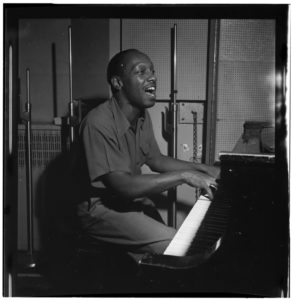Tadd Dameron
(1917–1965) was a Cleveland-born jazz composer, pianist and arranger for such
bands as those of Count Basie, Artie Shaw, Jimmie Lunceford, Dizzy Gillespie,
Billy Eckstine, and Sarah Vaughan, for whom he and lyricist Carl Sigman wrote
“If You Could See Me Now.” In the late 1940s, Dameron wrote arrangements for Gillespie’s big band, which gave the première of his large-scale orchestral piece
Soulphony in Three Hearts at Carnegie Hall in 1948.
Also in 1948, Dameron led his own group in New York, which included Fats Navarro; the following year Dameron was at the Paris Jazz Festival with Miles Davis. From 1961 he scored for recordings by Milt Jackson and Sonny Stitt. Saxophonist Dexter Gordon called him the “romanticist” of the bop movement, while reviewer Scott Yanow wrote that Dameron was the “definitive arranger/composer of the bop era.”

Portrait of Tadd Dameron, New York, N.Y., between 1946 and 1948
“While he played with bebop groups and arranged for a variety of big bands,” says Cleveland Jazz historian Joe Mosbrook, “Dameron was mainly a composer, writing more than 200 songs, some of which have become standards. The 1935 graduate of Cleveland’s old Central High School, where he joined his first band, a group led by high school pal Freddie Webster in trumpet, did not immediately become a household name but was extremely influential among musicians. In the past year alone—54 years after his early death—there have been several new recordings of his compositions.”
Dameron’s “Hot House,” composed in 1945 and made famous by Dizzy Gillespie and Charlie Parker in a quintet arrangement, quickly became an anthem of the bebop movement in American jazz. The most famous performance of the tune, by Parker and Gillespie, is on the May 1953 live concert recording entitled Jazz at Massey Hall. The pair had already recorded it for Savoy records in 1945 and at Carnegie Hall in 1947. The tune, which remains a favorite with jazz musicians and enthusiasts, has been recorded many times. Philly Joe Jones, who organized a tribute group called Dameronia,
did a classic version of “Look, Stop and Listen”; John Coltrane, “On a Misty Night”; Fats Navarro, “Our Delight.” “Good Bait” was written for Count Basie.
Local authorities include Cleveland jazz historians Joe Mosbrook and Greg Reese, WCLV’s Jon Simna & WCPN’s Dan Polletta.